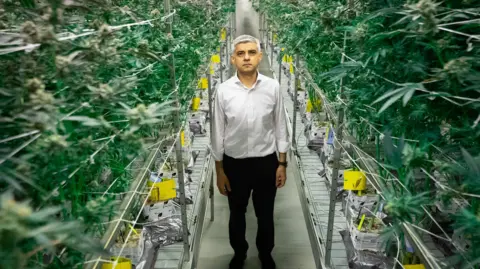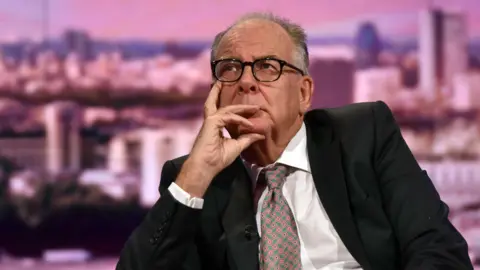London mayor backs report calling for cannabis decriminalisation
May 27, 2025
Mayor backs report’s call for cannabis law reform
 PA Media
PA MediaThe possession of small quantities of cannabis for personal use should be decriminalised, a report backed by the London mayor has concluded.
The report by the London Drugs Commission, chaired by former Labour cabinet minister Lord Falconer, makes 42 recommendations, including removing natural cannabis from the Misuse of Drugs Act (MDA).
Sir Sadiq Khan said current rules “cannot be justified”, adding that the commission’s findings had provided “a compelling, evidence-based case” for decriminalisation.
David Raynes, of the National Prevention of Drugs Alliance (NPDA), said any reduction in the legal consequences around cannabis would wrongly send the message that “cannabis was less harmful”.
Lord Falconer said that while “legalisation is not the answer”, the criminal justice system should “focus only on the dealers and not the users”.
The report makes recommendations in areas covering education, healthcare and the policing of cannabis.
Among the recommendations, it says natural cannabis should be removed from the MDA, where it is considered Class B alongside drugs like ketamine, and instead maintain it as a controlled substance under the Psychoactive Substances Act (PSA).
The report states: “The possibility of a custodial prison sentence of any length, but certainly up to the current maximum of five years, for possession of cannabis for personal use feels excessive.”
While acknowledging that it is very rare for anyone to be sentenced anywhere close to the five years, the authors said the “consequences of serving any time in prison are significant”.
The report states that police officers often identify cannabis possession through the use of stop and search which “continues to be utilised in a racially disproportionate way”.
Its authors call for the suspicion of cannabis possession to be removed as a reason officers can initiate a search.
The authors argue even when a person is found with an amount deemed beyond personal use, the current legal consequences “feel extreme, relative to the dangers of cannabis itself”.

Regulating cannabis under the PSA, the authors argue, would expose fewer people to stop and search, help tackle “racial disproportionality”, and make any legal consequences “commensurate with the risks posed”.
They add decriminalising it would reduce the impact on those who take cannabis for medicinal purposes but are not able to get a legal prescription.
Janet Hills, the commission’s deputy chair who was a former detective sergeant and chair of the Met’s Black Police Association, said it was time to “shift in our approach to cannabis enforcement”.
She said the recommendations would “create a more equitable and just system”.
Among the other recommendations made in the report are to:
- Improve public health services for cannabis-related harm, including better treatment access and coordination
- Enhance cannabis education with earlier, age-appropriate, and credible content in schools and beyond
- Support fair access to medical cannabis, including addressing cost barriers and expanding research
- Monitor international developments and reassess the case for broader legalisation in five years
Lord Falconer said: “Those who suffer from the adverse effects of cannabis – which may be a small percentage of users but it is a high number of people – need reliable, consistent medical and other support. And there needs to be much more education on the risks of cannabis use.”
Mr Raynes, who has long been against any liberalisation in Britain’s drug policy, said that the report’s authors were attempting to “modify the law as gently as possible”.
“The real danger is that we send a signal to the youth of London that cannabis is less harmful,” he said.
‘Long overdue’
Asked about the point made in the report that cannabis is still widely used despite the current legal consequences, Mr Raynes said it was about “restricting the damage” done by illegal substances.
He added that the London Drugs Commission, which Sir Sadiq established in 2022, was “an enormous piece of self-indulgence by the mayor” in a policy area in which he has no authority over.
Responding to the report, the mayor said: “I’ve long been clear that we need fresh thinking on how to reduce the substantial harms associated with drug-related crime in our communities.”
He added: “We must recognise that better education, improved healthcare and more effective, equitable policing of cannabis use are long overdue.”
The Home Office has been asked to comment on the report.
In March, Dame Diana Johnson, a minister at the department, said the government had “no plans” to legalise cannabis but did not address decriminalisation.
In a 2023 interview as opposition leader, Sir Keir Starmer said drug policy was “settled” in the UK.
Listen to the best of BBC Radio London on Sounds and follow BBC London on Facebook, X and Instagram. Send your story ideas to hello.bbclondon@bbc.co.uk
Search
RECENT PRESS RELEASES
Related Post




